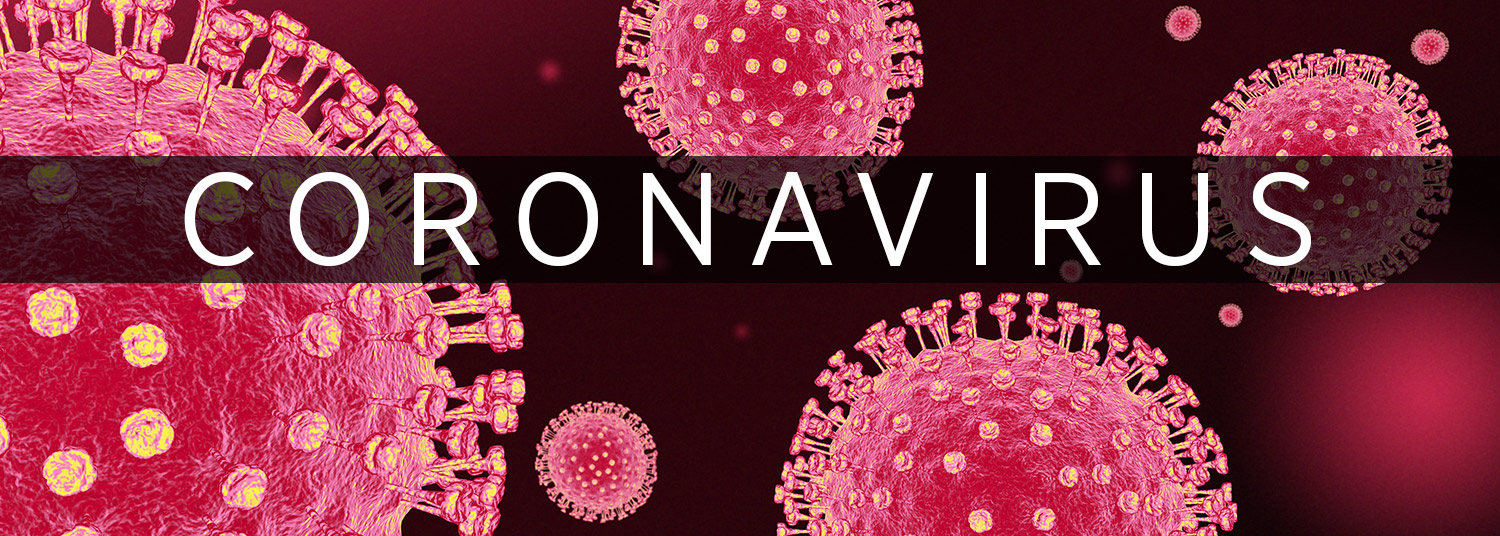January 29, 2020
UMSOM Collaborating with Relevant Entities; Ready to Provide Expertise, Planning and Coordination if Called to Respond
As public health officials around the world are monitoring a new coronavirus strain (2019-nCoV) first identified in the Wuhan City, Hubei Province, China, the University of Maryland School of Medicine (UMSOM) is mobilizing its physicians and scientists in the UMSOM’s Center for Vaccine Development and Global Health (CVD), and in its Department of Microbiology & Immunology, to study the virus and test potential vaccines and other therapies. In addition, the UMSOM is collaborating with the University of Maryland Medical Center (UMMC) on rapid response and preparedness planning in the event of a growing outbreak.
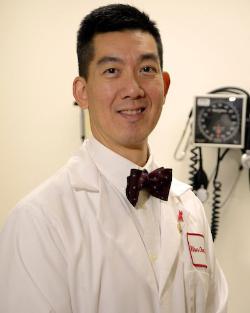 A team of experts has also been assembled by the University of Maryland, Baltimore (UMB) as the Emergency Management Unified Command Committee. This committee includes Wilbur Chen, MD, Associate Professor in the UMSOM Department of Medicine and an infectious disease expert in the CVD. At the University of Maryland College Park, Dr. Chen is also a member of the Campus Infectious Disease Management Committee (CIDMC), where response planning is similarly ongoing for an appropriate campus-wide public health response to 2019-nCoV.
A team of experts has also been assembled by the University of Maryland, Baltimore (UMB) as the Emergency Management Unified Command Committee. This committee includes Wilbur Chen, MD, Associate Professor in the UMSOM Department of Medicine and an infectious disease expert in the CVD. At the University of Maryland College Park, Dr. Chen is also a member of the Campus Infectious Disease Management Committee (CIDMC), where response planning is similarly ongoing for an appropriate campus-wide public health response to 2019-nCoV.
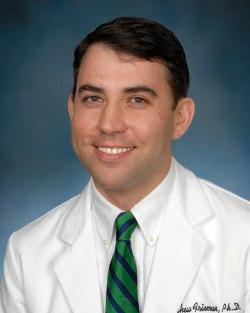 Matthew Frieman, PhD, Associate Professor in the UMSOM Department of Microbiology and Immunology, and an affiliate faculty member of CVD, is an expert on coronaviruses. He is providing guidance and support for identifying potential cases of 2019-nCoV infection. Kathleen Neuzil, MD, MPH, the Myron M. Levine, MD, Professor in Vaccinology, Professor of Medicine and Pediatrics and Director of the CVD, is Co-Principal investigator of the National Institute of Health’s (NIH) Infectious Diseases Clinical Research Consortium Leadership Group. Dr. Neuzil has been in discussions on the planning of potential therapies and vaccines against 2019-nCoV.
Matthew Frieman, PhD, Associate Professor in the UMSOM Department of Microbiology and Immunology, and an affiliate faculty member of CVD, is an expert on coronaviruses. He is providing guidance and support for identifying potential cases of 2019-nCoV infection. Kathleen Neuzil, MD, MPH, the Myron M. Levine, MD, Professor in Vaccinology, Professor of Medicine and Pediatrics and Director of the CVD, is Co-Principal investigator of the National Institute of Health’s (NIH) Infectious Diseases Clinical Research Consortium Leadership Group. Dr. Neuzil has been in discussions on the planning of potential therapies and vaccines against 2019-nCoV.
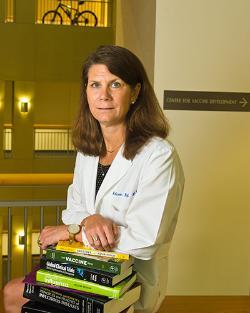 In coordination with UMMC, UMSOM’s Senior Associate Dean for Clinical Affairs, Anthony Lehman, MD, MSPH, is working closely with Michael Jablonover, MD, MBA, FACP, Senior Vice President and Chief Medical Officer at UMMC to form a Coronavirus Preparedness Committee. The group is chaired by David Marcozzi, MD, MHS-CL, FACEP, UMSOM Associate Professor of Emergency Medicine, and Gregory Schrank, MD, MPH, Assistant Professor of Medicine at the UMSOM. They will be charged with ensuring that coordinated UMSOM/UMMC preparedness plans are defined, implemented and articulated to all relevant constituencies.
In coordination with UMMC, UMSOM’s Senior Associate Dean for Clinical Affairs, Anthony Lehman, MD, MSPH, is working closely with Michael Jablonover, MD, MBA, FACP, Senior Vice President and Chief Medical Officer at UMMC to form a Coronavirus Preparedness Committee. The group is chaired by David Marcozzi, MD, MHS-CL, FACEP, UMSOM Associate Professor of Emergency Medicine, and Gregory Schrank, MD, MPH, Assistant Professor of Medicine at the UMSOM. They will be charged with ensuring that coordinated UMSOM/UMMC preparedness plans are defined, implemented and articulated to all relevant constituencies.
About the Coronavirus
Coronaviruses are part of a family of viruses that can affect humans and are commonly found in many different species of animals. Symptoms are usually those of the common cold and can include a dry cough, fever, or chills. More severe cases can occur in individuals with weakened immune systems and the elderly.
The 2019 Novel Coronavirus (2019-nCoV) outbreak originating in Wuhan, China is a rapidly evolving situation. Scientists at UMSOM are well-positioned to respond to this situation because of their extensive experience.
UMSOM experts note that coronaviruses are a leading cause of respiratory illness in patients, accounting for at least 15% of all viral respiratory illnesses. “We typically do not test for what viruses cause common cold-like symptoms, so we don’t have a good estimate of the number of infections they cause each year,” said Dr. Chen.
Coronaviruses may affect people or animals. Other coronaviruses leading to outbreaks in the past include the Middle East Respiratory Syndrome coronavirus (MERS) identified in 2012 and the Severe Acute Respiratory Syndrome (SARS-CoV) outbreak identified in 2003. To date, MERS has infected almost 2,500 people resulted in 858 associated deaths (a case fatality rate of ~35%) and SARS resulted in 8,098 known cases resulting 774 deaths (a case fatality rate of ~10%), according to the World Health Organization.
Dr. Frieman is currently investigating whether therapeutics he has developed for SARS and MERS will be effective against the new 2019-nCoV virus, as well as developing new treatments for this new emerging coronavirus.
While so far there has been limited spread of this latest strain of coronavirus outside of China, UMSOM experts recommend taking precautions to avoid spread of the illness, especially amid increased global travel and connectedness. According to the World Health Organization and other global health officials, it only took weeks before the 2019-nCoV made its way outside of the region, with five cases as of Jan. 27 reported in the United States.
 “As we continue to learn more about this new strain of coronavirus, we encourage best hygiene practices, such as limiting exposure to those who are sick, staying home when you are sick, and regularly washing hands. We know that influenza has similar symptoms to the coronavirus, and is circulating in Maryland. We encourage everyone who has not yet done so to receive the influenza vaccine ,” said Dr. Neuzil.
“As we continue to learn more about this new strain of coronavirus, we encourage best hygiene practices, such as limiting exposure to those who are sick, staying home when you are sick, and regularly washing hands. We know that influenza has similar symptoms to the coronavirus, and is circulating in Maryland. We encourage everyone who has not yet done so to receive the influenza vaccine ,” said Dr. Neuzil.
There currently is no vaccine to prevent coronavirus infections, however experts say the best way to prevent the spread of illnesses from respiratory viruses, like 2019-nCoV, are the same important precautions that should be taken with influenza. The 2019-2020 influenza season is underway, and the winter months bring on higher incidence of other respiratory illnesses. Currently there is widespread influenza in the state of Maryland.
“With our longstanding leadership in vaccine development, The University of Maryland School of Medicine is ideally positioned to mobilize resources around the research, prevention and treatment of infectious diseases, such as this new coronavirus,” said UMSOM Dean E. Albert Reece, MD, PhD, MBA, who is also Executive Vice President for Medical Affairs, UM Baltimore, and the John Z. and Akiko K. Bowers Distinguished Professor, University of Maryland School of Medicine. “The physician-scientists in our Center for Vaccine Development & Global Health, and our Department of Microbiology & Immunology, are ready to study this new coronavirus, test potential vaccines, and work with health officials around the world. Through our partnership with the University of Maryland Medical Center, we are taking immediate steps to prepare for the potential outbreak of this virus.”
Public health officials caution that amid the current influenza season and growing concerns about this new coronavirus strain, there are many important steps that can be taken to prevent spread of illness.
As recommended by the Centers for Disease Control and Prevention, these steps include:
- Regular hand washing with soap and water for at least 20 seconds or using alcohol-based hand sanitizers.
- Avoiding touching your eyes, nose and mouth with unwashed hands
- Cover your cough or sneeze with a tissue, then throw the tissue in the trash
- In China, avoiding animals (alive or dead), animal markets, and products that come from animals (such as uncooked meat).
- Remaining at home when individuals have symptoms such as a persistent cough, fever, diarrhea and chills.
- Cleaning and disinfecting frequently touched objects and surfaces.
- Complete your annual influenza vaccination, if not yet done, to reduce illness from influenza.
Public health officials have already taken steps to prevent the spread of this latest strain, drawing on experience from prior outbreaks like SARS and MERS. For example, public health authorities such as WHO and the CDC have initiated preparedness and response activities. Officials in Wuhan have closed local transportation resources out of the area to help reduce the spread of the virus.
In addition, the United States and several other countries have started screening passengers from Wuhan, China at airports and other ports of entry. Health practitioners in other Chinese cities, as well as other countries including the U.S, have quickly identified travel-related cases and have isolated individuals for further care.
Information for Students and Employees
Students and employees who are experiencing fever or symptoms of respiratory illness and have either returned from China or have had close contact with a person under investigation for 2019-nCoV within the past 14 days should call University of Maryland Immediate Care at 667-214-1800 during normal business hours or their primary care provider's office immediately.
After normal business hours, students calling this line will be transferred to the physician on call.
After normal business hours, employees should call 443-466-0033 to reach the UMSOM employee health consultant.
Important Resources & News
Watch This Video:
About the Center for Vaccine Development and Global Health
For over 40 years, researchers in the Center for Vaccine Development and Global Health have worked domestically and internationally to develop, test, and deploy vaccines to aid the world’s underserved populations. CVD is an academic enterprise engaged in the full range of infectious disease intervention from basic laboratory research through vaccine development, pre-clinical and clinical evaluation, large-scale pre-licensure field studies, and post-licensure assessments. CVD has worked to eliminate vaccine-preventable diseases. CVD has created and tested vaccines against cholera, typhoid fever, paratyphoid fever, non-typhoidal Salmonella disease, shigellosis (bacillary dysentery), Escherichia coli diarrhea, nosocomial pathogens, tularemia, influenza, malaria and other infectious diseases. CVD’s research covers the broader goal of improving global health by conducting innovative, leading research in Baltimore and around the world. CVD researchers are developing new and improved ways to diagnose, prevent, treat, control, and eliminate diseases of global impact. Currently, these diseases include typhoid, Shigella, E. coli diarrhea, malaria, and other vaccine-preventable infectious diseases. CVD researchers have been involved in critical vaccine development for emerging pathogens such as Ebola and Zika. In addition, CVD’s work focuses on the ever-growing challenge of anti-microbial resistance.
About the University of Maryland School of Medicine
Now in its third century, the University of Maryland School of Medicine was chartered in 1807 as the first public medical school in the United States. It continues today as one of the fastest growing, top-tier biomedical research enterprises in the world -- with 45 academic departments, centers, institutes, and programs; and a faculty of more than 3,000 physicians, scientists, and allied health professionals, including members of the National Academy of Medicine and the National Academy of Sciences, and a distinguished two-time winner of the Albert E. Lasker Award in Medical Research. With an operating budget of more than $1.2 billion, the School of Medicine works closely in partnership with the University of Maryland Medical Center and Medical System to provide research-intensive, academic and clinically based care for nearly 2 million patients each year. The School of Medicine has more than $540 million in extramural funding, with most of its academic departments highly ranked among all medical schools in the nation in research funding. As one of the seven professional schools that make up the University of Maryland, Baltimore campus, the School of Medicine has a total population of nearly 9,000 faculty and staff, including 2,500 student trainees, residents, and fellows. The combined School of Medicine and Medical System (“University of Maryland Medicine”) has an annual budget of nearly $6 billion and an economic impact more than $15 billion on the state and local community. The School of Medicine faculty, which ranks as the 8th highest among public medical schools in research productivity, is an innovator in translational medicine, with 600 active patents and 24 start-up companies. The School of Medicine works locally, nationally, and globally, with research and treatment facilities in 36 countries around the world. Visit medschool.umaryland.edu
About the University of Maryland Medical Center
The University of Maryland Medical Center (UMMC) is comprised of two hospital campuses in Baltimore: the 800-bed flagship institution of the 14-hospital University of Maryland Medical System (UMMS) — and the 200-bed UMMC Midtown Campus, both academic medical centers training physicians and health professionals and pursuing research and innovation to improve health. UMMC’s downtown campus is a national and regional referral center for trauma, cancer care, neurosciences, advanced cardiovascular care, women's and children's health, and has one of the largest solid organ transplant programs in the country. All physicians on staff at the downtown campus are clinical faculty physicians of the University of Maryland School of Medicine. The UMMC Midtown Campus medical staff is predominately faculty physicians specializing in diabetes, chronic diseases, behavioral health, long-term acute care and an array of outpatient primary care and specialty services. UMMC Midtown has been a teaching hospital for 140 years and is located one mile away from the downtown campus. For more information, visit www.umm.edu
Contact
Office of Public Affairs
655 West Baltimore Street
Bressler Research Building 14-002
Baltimore, Maryland 21201-1559
Contact Media Relations
(410) 706-5260
Related stories

Thursday, November 19, 2020
Promising Results Seen in Pfizer/BioNTech COVID-19 Vaccine After Phase 1 Trial by University of Maryland School of Medicine
Just six months after beginning a clinical development program that first enrolled here at the University of Maryland School of Medicine (UMSOM), Pfizer and BioNTech report interim results showing an mRNA COVID-19 vaccine had no serious safety concerns and has been found to be 95 percent effective in protecting individuals from COVID-19.
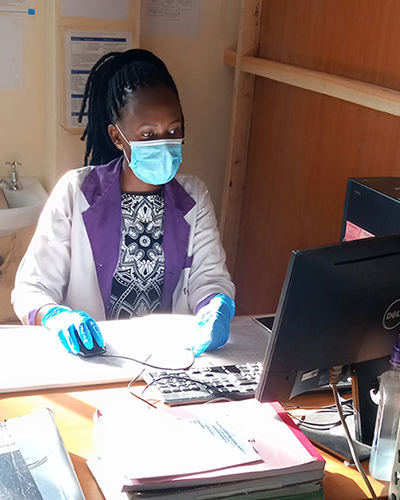
Tuesday, June 02, 2020
UM School of Medicine’s Institute of Human Virology Awarded Grants to Strengthen COVID-19 Response in Sub-Saharan Africa
The Center for International Health, Education and Biosecurity (Ciheb) at the University of Maryland School of Medicine’s Institute of Human Virology was awarded $4 million from the U.S. Centers for Disease Control and Prevention (CDC) to support coronavirus disease 2019 (COVID-19) response activities in Botswana, Nigeria, Malawi, and Mozambique.
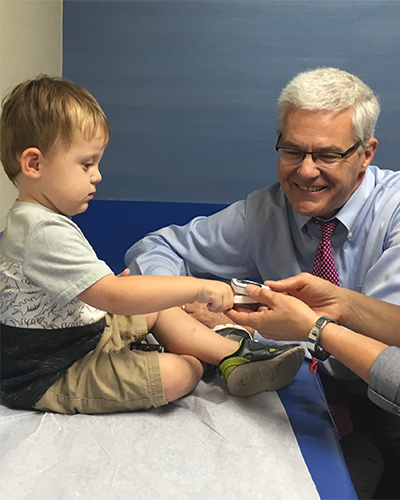
Monday, June 01, 2020
In A COVID-19 World, Another Threat to the Health of Our Children
In the U.S., our children rarely fall ill to grave infections because they are protected by vaccines. Serious illnesses like measles, mumps, congenital rubella syndrome, chickenpox, diphtheria, tetanus, whooping cough, rotavirus diarrhea, hepatitis (A and B), polio and bacterial meningitis are all preventable through routine childhood vaccinations.
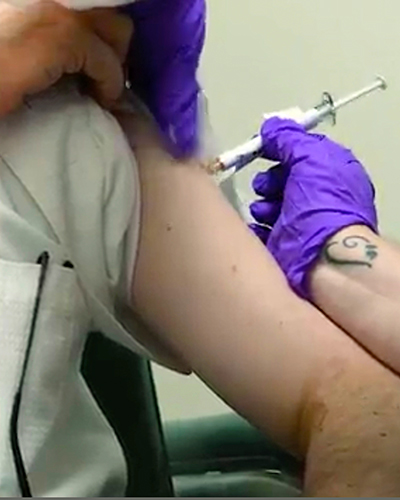
Tuesday, May 05, 2020
UM School of Medicine is First in U.S. to Test Unique RNA Vaccine Candidate for COVID-19
In a significant development in the global effort to discover a safe and effective vaccine for COVID-19, researchers at the University of Maryland School of Medicine (UMSOM) became the first in the U.S. to begin testing experimental COVID-19 vaccine candidates developed by Pfizer and BioNTech. The research, funded by Pfizer Inc., will study the safety, efficacy, and dosing of an experimental mRNA -based vaccine.
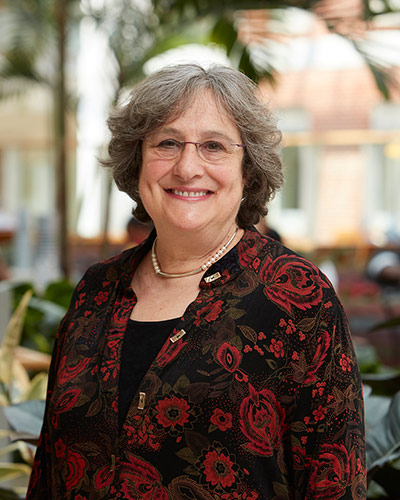
Thursday, April 23, 2020
UM School of Medicine Researchers Test Remdesivir as Potential Therapy for COVID-19 Patients
Researchers at the University of Maryland School of Medicine (UMSOM) are testing the effectiveness of the investigational antiviral drug remdesivir in hospitalized adult patients with SARS-CoV-2 (COVID-19). The randomized controlled clinical trial is evaluating the safety and effectiveness of the drug, and it is part of a national study funded by the National Institute of Allergy and Infectious Diseases (NIAID) of the National Institutes of Health (NIH).
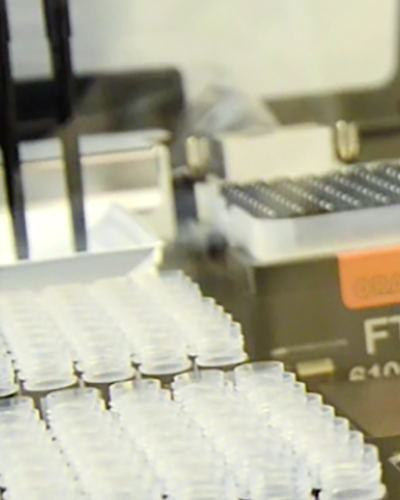
Friday, April 10, 2020
University of Maryland School of Medicine Launches New Large Scale COVID-19 Testing Initiative
University of Maryland School of Medicine (UMSOM) Dean E. Albert Reece, MD, PhD, MBA, announced today the launch of a large-scale COVID-19 Testing Initiative that will significantly expand testing capability over the coming weeks, enabled by new funding of $2.5 million from the State of Maryland.

Wednesday, April 01, 2020
Important Coronavirus Update from Dean Reece 04-01
I am sure you are aware of Governor Hogan’s Executive Order that requires all residents of Maryland to stay at home, except for essential activities. The Governor continues to emphasize that we are still just at the beginning of this crisis in Maryland. While the State has been taking the lead with early containment efforts, we are now at a critical point. Each of our actions can lessen the expected surge in cases over the next few weeks.

Wednesday, March 25, 2020
Kids & COVID-19 Website Provides Resources for Pediatric Healthcare Providers and Families
The University of Maryland School of Medicine has launched a special COVID-19 website for pediatric healthcare providers and practices, parents, and children. This resource brings together important research, professional guidance for pediatric practices, and practical tips for parents and caregivers.

Wednesday, March 25, 2020
Important Coronavirus Update from Dean Reece
As we continue to move forward in these challenging times, I would like to bring you a message of encouragement and hope. First and foremost, please be assured and confident that we are, and will continue to do, everything we can to ensure the health and well-being of all within our community. As you will see in this briefing, significant steps are being taken by the State of Maryland, the University of Maryland Medical System and the University of Maryland, Baltimore to ensure that everyone is healthy and safe. We must each do whatever is necessary to ensure that our health comes first.

Tuesday, February 25, 2020
Washington Post Visits UM School of Medicine Laboratories, Meets with Scientists About Coronavirus
Result is front-page feature coverage of UMSOM’s leading work in studying the Virus

